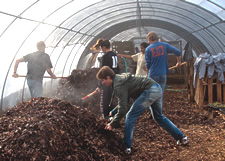 BioCycle May 2011, Vol. 52, No. 5, p. 22
BioCycle May 2011, Vol. 52, No. 5, p. 22
Washington, DC entrepreneur collects food scraps from over 120 residences and a few commercial accounts, delivering the material to urban farms.
Molly Farrell Tucker
ENTREPRENEUR Jeremy Brosowsky is trying to help build the infrastructure to provide urban farms with the food scraps they need to produce compost. Brosowsky started Compost Cab in March 2010 to collect food scraps from residences and businesses inside the Beltway, in and around Washington, D.C. Residential customers pay $8/week to have their food scraps and coffee grounds collected and brought to local urban farms. The customers are supplied with a customized 5- to 7-gallon plastic paint bucket fitted with an airtight lid and a compostable liner. Each week, the buckets are collected and clean bin and liner is left in its place.

Compost Cab started residential pick-ups in September 2010 and currently has more than 120 residential subscribers. “Our charter subscribers came through word of mouth, and that’s how most of our steady growth continues to happen,” says Brosowsky. “We’ve never spent a dime on advertising, choosing instead to devote resources to partnering well and widely.”
He is on the road five days a week with a small dump truck, collecting the food scraps and delivering them to the farms. A part-time employee assists. “Urban farms are relatively small, so you can’t send a 30-yard garbage truck there,” he says, predicting the following: “For near-in, pocket composting, tiny trucks are the wave of the future – these will be some of the first trucks to be powered electrically.”
On Sunday mornings, Compost Cab also offers a residential drop-off service. People can bring their food scraps to the Dupont Circle Farmers’ Market, the largest such market in Washington, DC. Afterward, material collected – including the Market’s own organics – is delivered to the Farm at Walker Jones, an urban farm attached to a District public school within sight of the U.S. Capitol. “Connecting the community to the farm through composting is something we’re really excited about,” says Sarah Bernardi, the farm director at Walker Jones. “It’s a tangible way for people to support urban agriculture. It’s a powerful teaching tool. And over time it makes for better soil.”

Compost Cab partners with a larger hauler to collect organics from some commercial customers. “Only a large vehicle can efficiently collect from large food-waste producers like hotels, restaurants, caterers or supermarkets,” Brosowsky says. “And so for those sorts of customers, we’re happy to partner. We view it as absorbing excess hauling capacity that’s already in the system and putting it to good use. There is no need for us to put more large trucks on the road to make composting happen locally.” Those materials are taken to a commercial composter outside of the Beltway in Maryland.
Different arrangements are made with each household as to where to leave their bins for pick up. “The filled bins can be put on the front porch, in the driveway or in the alley,” says Brosowsky. Customers in condominium and apartment complexes can leave their buckets at a lobby desk, on a loading dock, or even in front of their units’ front doors, as long as Compost Cab can gain access. Commercial customers use larger totes, usually collected directly from the alley or a loading dock. “All things being equal, people want to do the right thing,” he adds. “Our job is to make it as easy as possible for people so they will actually participate.”
ECO CITY FARMS
While Compost Cab is actively developing new urban farm partners, most of the material it collects is delivered to ECO City Farms, a not-for-profit urban farm operation started in May 2010 in Edmonston, Maryland inside the Capital Beltway. Tons of organic material, including the food scraps, leaves and woodchips, are composted monthly, and the farm is exploring opportunities to dramatically increase capacity.
ECO’s compost, worm castings and worm tea are used to grow food on a small, three-quarter acre farm. Produce includes vegetables, shoots and herbs. The farm’s products are sold at two local food coops, two farmers’ markets and two restaurants. This summer, it will also sell fresh eggs from the farm’s six chickens, raw honey from its two beehives, mushrooms, worm castings and compost.
After nine months of service, Compost Cab offers each residential customer 10 pounds of compost and one pound of worm castings for every 100 pounds of organics collected from the household. The Compost Cab driver weighs each bin with a hand scale at collection, and keeps a record of each household’s output. Customers who don’t want or need the compost or castings can donate back to the ECO farm, which will put it to use growing food. Commercial customers currently do not receive compost and castings. “The farms really need almost all that they produce,” says Brosowsky.
Both Brosowsky and ECO employees completed courses in commercial urban agriculture under Macarthur fellow Will Allen at Growing Power in Milwaukee, Wisconsin before starting their enterprises. “I’m trying to prove out a model that a person with a truck in any given city can make a living doing what I’m doing,” says Brosowsky. “This is an opportunity to do good and do well.” To that end, Agricity, the start-up behind Compost Cab, is developing an online “tool kit” for others to launch similar businesses around the country. “We’ve figured out how to do it here in DC,” Brosowsky says. “Now we want to see a thousand urban farms bloom… powered by compost!”
May 17, 2011 | General










